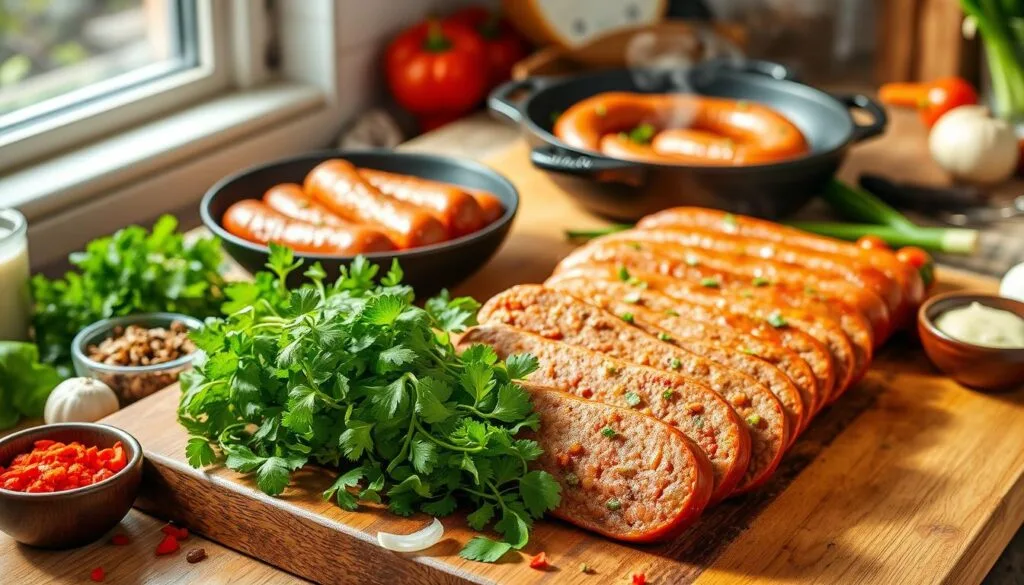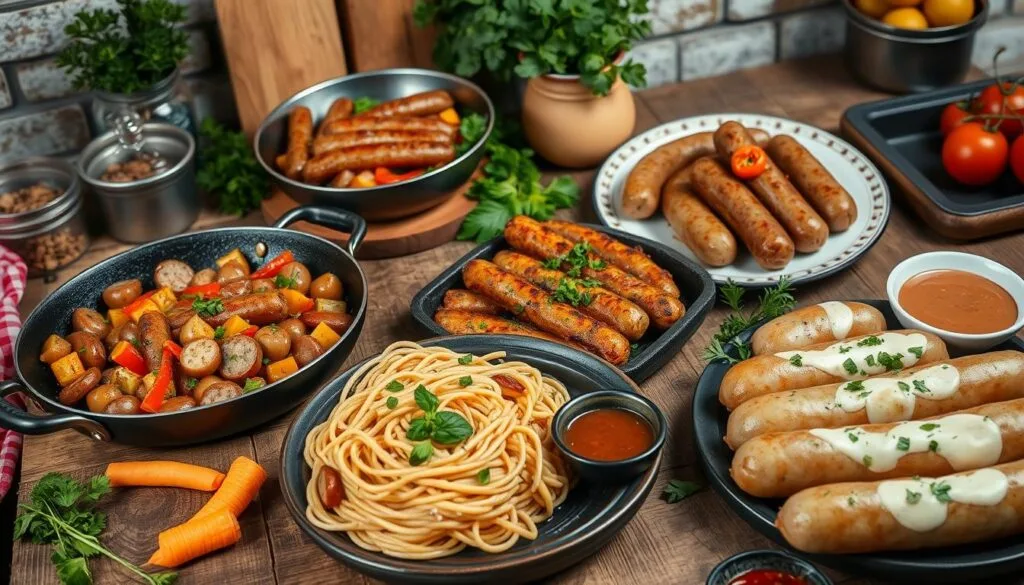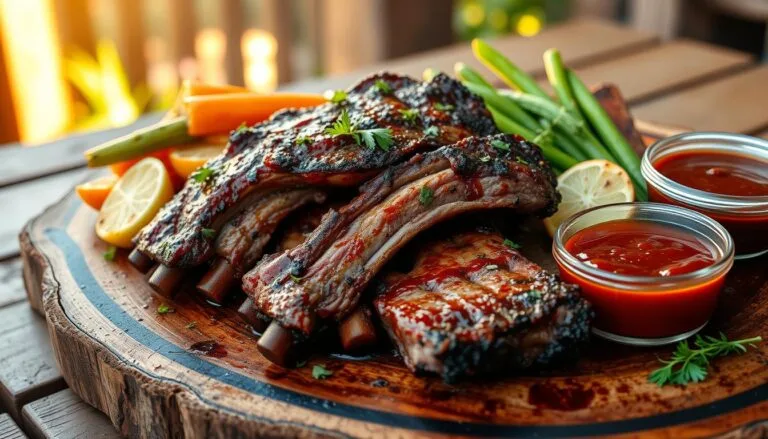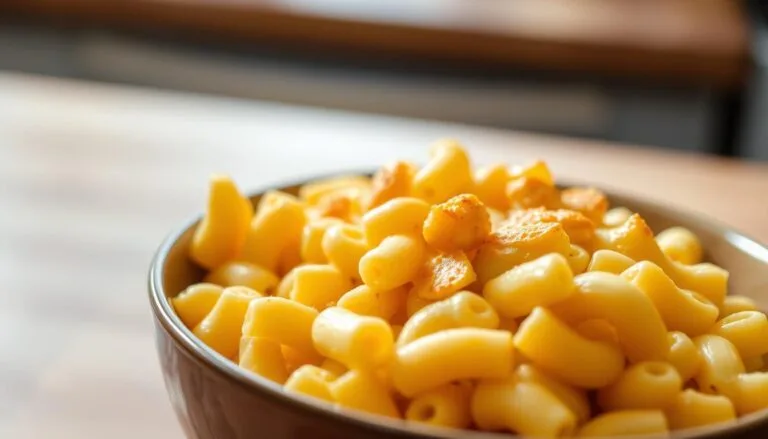Ground Beef Sausage Recipes: Delicious Ideas to Try at Home
Every Sunday morning, my grandmother’s kitchen would fill with the sizzle of homemade beef sausage. The smell of spices and perfectly browned meat made unforgettable memories. These moments sparked my love for making ground beef sausage recipes that bring families together.
Ground beef sausage is more than a meal; it’s a culinary adventure in your kitchen. Whether you’re a busy home cook or enjoy cooking on weekends, making your own beef sausage is a great way to improve your meals. It’s also budget-friendly.
With just 10 minutes of prep and 45 minutes of cooking, you can make delicious sausage dishes. These recipes are great for any meal, adding variety to your cooking.
In this guide, you’ll learn to make top-notch ground beef sausage recipes at home. We’ll cover everything from classic breakfast patties to Italian-style sausages. You’ll become a sausage-making pro.
Get ready to make delicious, juicy, and perfectly seasoned beef sausage. It will impress your family and friends. Your culinary journey begins now!
Table of Contents
Understanding the Basics of Homemade Beef Sausage
Making homemade beef sausage is an art. It mixes quality ingredients, proper techniques, and a love for cooking. Whether you’re new or experienced, learning the basics can boost your cooking skills.
Key Ingredients for Perfect Beef Sausage
Choosing the right ingredients is key for tasty sausages. Start with high-quality ground beef. It should have a lean to fat ratio of 85% to 15% for juicy and flavorful results.
- Ground beef (85/15 lean-to-fat ratio)
- Salt and black pepper
- Garlic powder
- Onion powder
- Ground sage
- Red pepper flakes
Essential Equipment and Tools
Good sausage-making equipment makes the process easier and fun. Get quality tools to make professional-grade sausages at home.
- Meat grinder
- Sausage stuffer
- Cutting board
- Sharp kitchen knife
- Mixing bowls
- Kitchen scale
Best Meat-to-Fat Ratio Tips
The secret to juicy sausages is the meat-to-fat ratio. Lean ground beef can make sausages dry and tough. Aim for 15-20% fat for the best texture and taste.
“The right balance of meat and fat is the foundation of delicious sausage.” – Professional Chef
Learning these basics will help you make tasty homemade beef sausages. They’ll impress your family and friends.
The Perfect Seasoning Blend for Beef Sausage
Making the perfect beef sausage seasoning turns simple ground meat into a dish to remember. Your homemade spices can make every bite special. Knowing the right mix of spices is crucial for a delicious beef sausage that will wow everyone.
When making your beef sausage seasoning, think about these key ingredients:
- Salt (primary flavor enhancer)
- Black pepper (for warmth)
- Garlic powder (depth of flavor)
- Onion powder (aromatic base)
- Smoked paprika (subtle smokiness)
- Dried thyme (herbal notes)
- Dried sage (traditional sausage flavor)
- Red pepper flakes (optional heat)
Experts say to use about 2 tablespoons of seasoning per pound of ground meat. This balance keeps the beef taste in check.
“The secret to great sausage is in the seasoning blend” – Professional Chef
For those trying homemade sausage spices, start with a basic mix and tweak it as you like. A basic recipe makes about 7 tablespoons, enough for up to 5 pounds of meat. Keep your custom seasoning in an airtight container for up to 2 months at room temperature.
| Ingredient | Quantity | Purpose |
|---|---|---|
| Salt | 5 teaspoons | Primary seasoning |
| Dried Sage | 5 teaspoons | Traditional sausage flavor |
| Brown Sugar | 2 tablespoons | Subtle sweetness |
Creating the perfect beef sausage seasoning is an art. Feel free to try new things and find your own special flavor!
Step-by-Step Guide to Making Ground Beef Sausage Recipes
Making homemade beef sausage is all about precision and technique. It’s a process that turns simple ground meat into a tasty dish. Each step is crucial for success.
Mixing and Handling Techniques
Here are some important tips for making your beef sausage:
- Use cold meat to prevent fat breakdown
- Mix seasonings thoroughly but gently
- Avoid over-mixing to maintain meat texture
Experts say to mix meat and spices for 1 minute. This keeps the sausage tender and evenly seasoned.
Forming and Shaping Methods
The way you shape your sausage depends on what you want. You can make:
- Patties for quick breakfast meals
- Bulk sausage for recipes
- Links using traditional casings
“Perfect sausage starts with careful meat preparation and mindful shaping techniques.”
Cooking Temperature Guidelines
It’s important to cook your sausage to the right temperature. This ensures it’s safe to eat and tastes great. Always cook it to 160°F (71°C).
| Cooking Method | Temperature | Approximate Time |
|---|---|---|
| Skillet | Medium heat | 4-5 minutes per side |
| Oven | 350°F | 25-30 minutes |
| Grill | Medium-high | 10-12 minutes total |
By sticking to these cooking temperatures and methods, you’ll make perfect beef sausage every time.
Classic Breakfast Beef Sausage Patties
Making your own sausage patties can make breakfast special. These patties are easy to make and full of flavor. They will make your morning meal better.
Choosing good ground beef is key when making sausage patties. Look for 85% lean meat and 15% fat. This mix makes the patties juicy and tasty.
Ingredients for Classic Breakfast Beef Sausage Patties
- 1 pound ground beef
- 2 teaspoons brown sugar
- 1.5 teaspoons dried sage
- 1.5 teaspoons salt
- 0.5 teaspoons black pepper
- 0.125 teaspoons garlic powder
- 0.125 teaspoons dried thyme
- 1/4 cup water
Preparation Guide
- Mix ground beef with all seasonings in a large bowl
- Add water and blend thoroughly
- Form into 2-ounce patties (approximately 2.5-3 inches diameter)
- Cook patties until internal temperature reaches 160°F
Cooking Methods
| Cooking Method | Temperature | Cooking Time |
|---|---|---|
| Skillet | Medium-High | 3-4 minutes per side |
| Air Fryer | 400°F | 7-9 minutes total |
Pro tip: Let patties rest for a few minutes after cooking to retain moisture and enhance flavor.
“A great breakfast starts with perfectly seasoned homemade sausage patties” – Culinary Experts
Storage Recommendations
- Refrigerator storage: 3-4 days
- Freezer storage (cooked): 1 month
- Freezer storage (uncooked): Up to 2 months
Each serving has 275 calories, 20g protein, and 21g total fat. Your homemade sausage patties are not just tasty. They also give you a protein-rich start to your day.
Italian-Style Ground Beef Sausage Recipe
Making homemade Italian sausage is simpler than you think. This recipe brings authentic flavors to your kitchen. It mixes traditional seasonings with top-notch ground beef.
To make perfect homemade Italian sausage, focus on the details and the right seasonings. The secret is using the best ingredients and mastering traditional flavors.
Traditional Italian Seasonings
The heart of any great Italian sausage is its seasoning. Here are the essential ingredients for an authentic taste:
- 2 teaspoons dried parsley
- 2 teaspoons Italian seasoning
- 1 1/2 teaspoons black pepper
- 1/2 teaspoon fennel seed
- 1 teaspoon red pepper flakes
- 2 teaspoons salt
- 1 tablespoon minced garlic
Cooking Methods and Times
| Cooking Method | Temperature | Cooking Time |
|---|---|---|
| Pan-Frying | Medium-High | 8-10 minutes |
| Grilling | Medium | 10-12 minutes |
| Baking | 350°F | 15-20 minutes |
Serving Suggestions
Your homemade Italian sausage is incredibly versatile. Try these delicious serving ideas:
- Slice and add to pasta dishes
- Crumble into spaghetti sauce
- Use in homemade meatballs
- Serve as a pizza topping
- Create hearty sandwiches
“The secret to great Italian sausage is in the seasonings and the love you put into preparing it.” – Italian Cooking Tradition
This homemade Italian sausage recipe makes about 12 servings. Each serving has 380 calories and 22 grams of protein. Remember to store leftover seasoning in an airtight container for later use.
Spicy Ground Beef Sausage Variations

Want a spicy kick in your meals? Spicy beef sausage can add excitement to your dishes. It’s perfect for those who love heat or want to spice up their food.
Make delicious spicy beef sausage with these options:
- Mild Heat: Use 1 teaspoon crushed red pepper flakes
- Medium Kick: Add 2 teaspoons cayenne pepper
- Extreme Heat: Incorporate 1 tablespoon hot paprika
Get inspiration from around the world. Mexican chorizo and Cajun andouille are great examples. The trick is to mix heat with other spices for a balanced taste.
“Spice is the variety of life – especially in sausage making!” – Home Chef Wisdom
Here are tips for making hot sausage recipes:
- Choose high-quality ground beef with 80/20 fat content
- Mix spices well for even heat
- Try your spice blend before making the sausage
- Let flavors mix in the fridge for 2-4 hours
Creating the perfect spicy beef sausage is an art. Try different peppers and adjust to your liking. Your taste buds will love the journey!
Meal Prep and Storage Solutions
When making homemade beef sausage, it’s important to store it right. This keeps its taste and quality. Good storage tips can make your sausages last for weeks.
Freezing Homemade Sausage Safely
Freezing your homemade sausage is a great way to keep it fresh longer. Here are some tips for freezing:
- Wrap sausages in plastic wrap or freezer paper
- Put them in airtight freezer bags
- Get rid of air to stop freezer burn
- Write the freezing date on the bags
Storage Duration and Best Practices
Knowing how long to store your sausage is key. It keeps your food safe and tasty. Here’s a guide for storage:
| Storage Method | Duration | Recommended Conditions |
|---|---|---|
| Refrigerator | 3-4 days | Use an airtight container |
| Freezer (Raw) | Up to 6 months | Sealed tightly, zero degrees Fahrenheit |
| Freezer (Cooked) | Up to 4 months | Wrapped well, little air |
Thawing and Reheating Methods
Thawing safely is important for sausage quality. Here are the best thawing methods:
- Refrigerator thawing (recommended): Put frozen sausages in the fridge 24 hours before cooking
- Cold water thawing: Soak sealed sausages in cold water, change water every 30 minutes
- Microwave thawing: Use defrost setting, cook right after thawing
“Proper storage is the secret to preserving the delicious flavor of homemade beef sausage.” – Culinary Expert
With these storage tips, you can enjoy your homemade sausages with confidence. They’ll always taste fresh and delicious.
Incorporating Beef Sausage in Different Dishes

Beef sausage recipes are incredibly versatile in the kitchen. Cooking with ground sausage opens up a world of tasty possibilities. It can turn simple meals into unforgettable dishes.
Here are some exciting ways to incorporate beef sausage into your cooking:
- Pasta Dishes: Create a hearty sausage and pepper pasta with ground beef sausage as the star ingredient
- Soups and Stews: Add depth and rich flavor to your favorite comfort food recipes
- Casseroles: Use beef sausage as a protein-packed base for one-dish meals
- Stuffed Vegetables: Fill bell peppers or zucchini with a savory beef sausage mixture
“The secret to great cooking is creativity and willingness to experiment with flavors” – Professional Chef
Cooking with ground sausage lets you explore different cuisines. Try adding beef sausage to Mexican dishes, Asian stir-fries, or Mediterranean recipes. The trick is to find the right balance with other ingredients.
For those watching their diet, consider these tips:
- Use lean ground beef sausage
- Drain excess fat after cooking
- Pair with vegetables for a balanced meal
Beef sausage recipes can make your cooking shine, whether it’s a quick dinner or a big event. They add flavor with little effort.
Common Mistakes to Avoid When Making Beef Sausage
Mastering beef sausage-making takes skill and attention to detail. Many home cooks face challenges that can affect their sausage quality. Knowing these common mistakes will make you a more confident sausage maker.
Top Sausage-Making Errors to Watch Out For
- Over-mixing the meat: This can make sausages dense and tough, lacking the right texture
- Incorrect meat-to-fat ratio, which affects flavor and juiciness
- Neglecting proper seasoning techniques
- Failing to monitor cooking temperatures
Beef sausage troubleshooting begins with knowing the key steps in preparation. The meat-to-fat ratio is key – aim for 80/20 lean-to-fat for the best juiciness and flavor.
“The difference between a good sausage and a great sausage is in the details.” – Culinary Expert
Temperature control is also crucial for successful sausage making. Always cook beef sausages to 160°F (71°C) to ensure safety and keep them moist.
| Common Mistake | Solution |
|---|---|
| Over-mixing | Mix just until ingredients are evenly distributed |
| Wrong Fat Ratio | Use 80/20 lean-to-fat meat blend |
| Incorrect Seasoning | Use 1–1.5 teaspoons salt per pound of meat |
| Temperature Mismanagement | Cook to 160°F internal temperature |
Avoiding these common mistakes will help you make delicious, professional-quality beef sausages in your own kitchen.
Conclusion
Starting your journey with homemade beef sausage recipes opens a world of flavors and creativity. You now know how to make meals as good as those in restaurants. You control what goes into your food, making it healthier and tastier.
Making sausage is more than cooking; it’s mastering a craft. With time, you’ll find that sausage recipes can turn simple ingredients into unforgettable dishes. Your skills will make every meal, from breakfast to brunch, special.
Cooking is a journey that never ends. Every time you make beef sausage, you get better and appreciate cooking more. Try new things, like different seasonings and cooking methods. Your kitchen is where you can be creative and make delicious dishes.
Share your cooking with others. It’s more fun when you can share tasty meals with friends and family. Your skills in making beef sausage are just the start of a fun cooking adventure.







